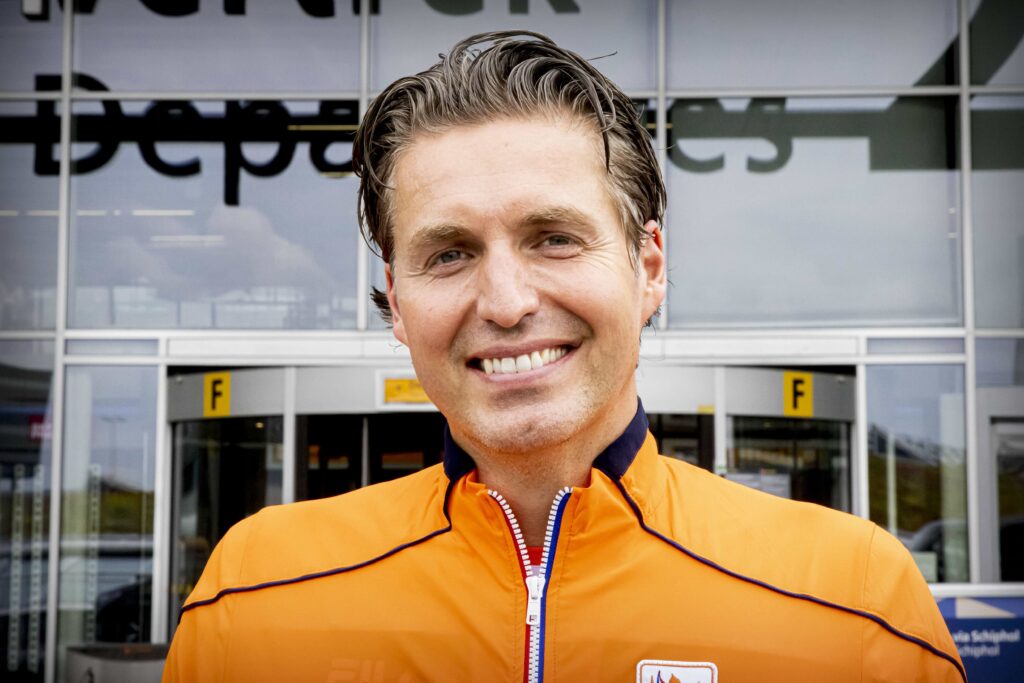Two decades ago, he was still swimming world records to pieces himself. Now Pieter Cornelis Martijn van den Hoogenband (1978), the man who other Olympians guided on their way to eternal fame. From The Dutch Dolphin to Chef de Mission...
Text: Gerben Bijpost
We meet up at Ozzo restaurant in the Eindhoven Van der Valk, but on arrival it turns out it doesn't open until three hours later. So we look for another quiet spot and end up at a table near a coffee bar. Next door are some consulting rooms, but they are all occupied. Pieter asks what I want to drink and walks to the bar. Make it tea, I say. Nothing to eat? No, thanks. A little later he stands in front of me with a box full of teas. Which one do you want?
The great Pieter van den Hoogenband, the first ever Dutchman to capture swimming gold at the Olympics, not once, but three times. Plus twice silver and twice bronze. Who became World Champion and numerous times Dutch and European Champion. Knight of the Order of the Dutch Lion (2000), World Swimmer of the Year (2000) and European Sportsman of the Year (2000), European Swimmer of the Year (1999, 2000, 2002, 2004) and Dutch Sportsman of the Year (1999, 2000, 2004) A living sports legend who now serves Olympic sporting Netherlands as Chef de Mission...
Yes, THIS Pieter is quietly waiting at the bar's cash register, paying for tea, coffee, a bottle of water and a healthy sandwich. And meanwhile, he points me to one of the consulting rooms. "Look at number 3. There they have a whole wall covered with my head." He says it with a hint of pride, but mostly a kind of genuine amazement. An amazement, I will soon notice, that suits his personality and outlook on life.
When we sit down again, I can indeed see through the glass of consulting room 3 a metre large, colourful silkscreen with a portrait of Van den Hoogenband adorning the wall. But next to me sits the real one. Approachable, with an open gaze, awaiting my questions.
I decide to open the conversation with a compliment. When I tell people I am going to interview you, they mostly react the same way: that seems like a nice guy. (pieter grins and raises his fist in the air in a kind of victory gesture).
Dan: "My grandmother used to say: a smile costs nothing. Everything starts with a basic attitude of gratitude and humility. That I am allowed to do this. In sport, I have seen the whole world, been able to travel a lot, been in many situations. By approaching them kindly, people open up faster. And you open up the world. By the way, you shouldn't confuse that with naivety, although that's fine too, to surprise yourself. But just being realistic and approaching things in a friendly way... It does make life easier.
There is an English pronunciation that means a lot to me: Be humble in victory and gracious is defeat. I also try to impart these values to my four children. They have been given what they have been given. It is up to them to develop that and do good for themselves and those around them with that given."
"Johan Cruijff taught me a lot in this respect ok. That was in 2008, right after I stopped swimming. I received an unexpected phone call from a Spanish number. Johan Cruijff on the line. Very special. We had a breakfast together at Van der Valk in Breda. He said: your career is over now; I want to help you make that next step. To make the values and information you have as a sportsman useful for other aspects and organisations within society. If someone like that, who knows a lot about this and for whom I have a lot of appreciation and respect, offers you something like that, something he doesn't have to do at all... Then I am enormously grateful for that."
Good example follows good practice.
"Chef de Mission is a serving role. In my way, I try to support athletes and coaches. If they need advice, I am there for them. But I never sit in the coach's chair. That's not my job. Operating smartly in the service of is my role now."
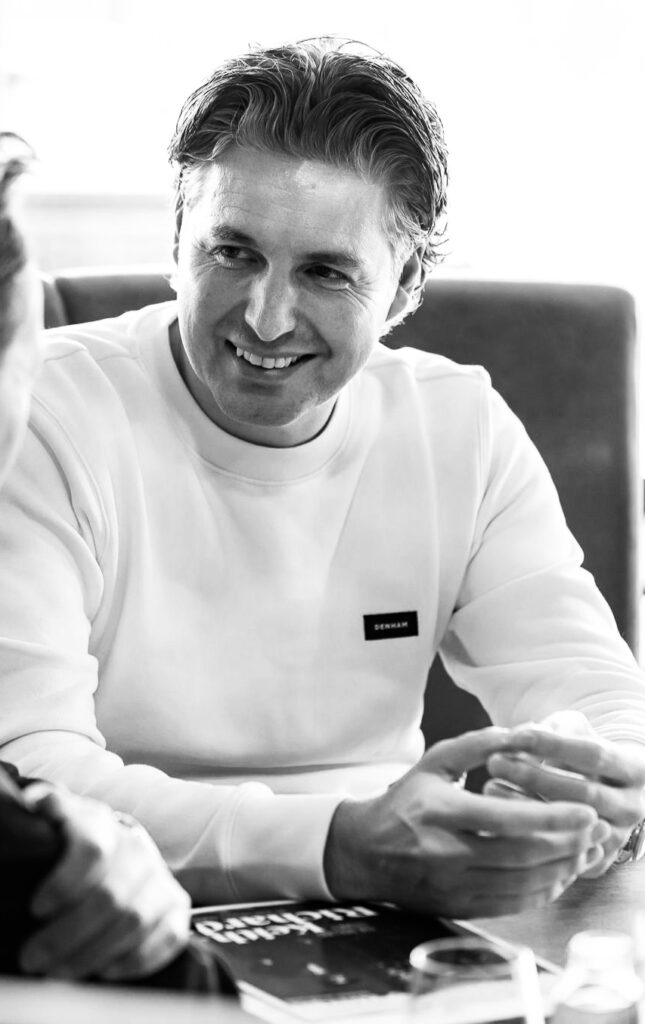 Are you also sometimes not nice?
Are you also sometimes not nice?
"Yes, yes... (a moment of doubt). Well, not nice might not be the right term. Clarity. Indicating where boundaries are. Starting a conversation and indicating that someone has crossed a line and then talking that out. That can then be interpreted as not nice, but I think it's precisely not nice when you don't indicate something like that and let a situation fester."
You are very approachable, also not awkward in your position.
"That's what I try to be, yes. These days I do. But I went through a period -and you may not be able to imagine this as a swimming champion- when I really had to create buffers. At one point there were just too many people - out of goodness, mind you - who wanted something from me. Something that took a lot of energy. And that was not useful, because I had to keep training and performing and give friends and family the attention they deserved."
The last games were extremely successful. The Netherlands won a total of 36 medals, the highest number ever, and finished seventh in the medal standings, the highest ranking ever. What are the ambitions for this year?
"I found it very annoying as a sportsman when bobos and administrators started telling me what my ambition should be. Athletes themselves know this very well. By definition, they travel with sky-high ambitions. And rightly so, because that's what you train for. You are qualified, so that means you belong in the top eight and are therefore a medal candidate.
But if you now talk about the medal standings, we as the Netherlands aim to finish in the top-10. How realistic that is exactly, I don't know yet, because I don't like to predict these things without knowing the exact opponents. And we don't know them yet. Out of respect for the athletes, I also think I should be cautious here. Although athletes themselves are often more outspoken, but that's up to them.
Of course, you do see the Netherlands performing well at international tournaments in recent years, so I think the team overall can go on to deliver another very nice performance.
And what's extra nice: we are also in the top five when it comes to ticket sales. So a huge orange legion will soon be heading our way. And the athletes think that's insanely cool. After all, that was the big miss in Tokyo."
What does that mean for you?
"Energy, one and all. And a very nice form of appreciation. That people sympathise, that they like it, that people give it to our athletes.
We are now working on getting everything right for the athletes so that they can peak at the right time later on. You first do that together, with other countries. But the closer the Games approach, the more it becomes every man for himself, in a fun way. Then you start competing against all those other countries. That phase is getting closer now. (laughing) And then just hope ours do better than those others."
Chef de Mission... How do you become one?
"You get asked to do that. In 2008, I had taken a break from sport to take time to reinvent myself. Among other things, I then read a great book by Yuval Noah Harari: 21 Lessons for the 21e century. Because yes, how do you reinvent yourself? By developing yourself, by being curious, I guess. And with 14 points of medicine and a couple of medals under your belt, that's pretty exciting. Because what future lies ahead of you? But that worked out well. At one point, I was approached by the NOC. They wanted to involve me in the sport again, in organising the European Youth Olympic Days, as youth Chef de Mission. I did that and that's how I rolled into that organisation. Then you start working together, evaluating, making things better... And eventually I was asked for the ultimate position: Chef de Mission of the Dutch Olympic Team."
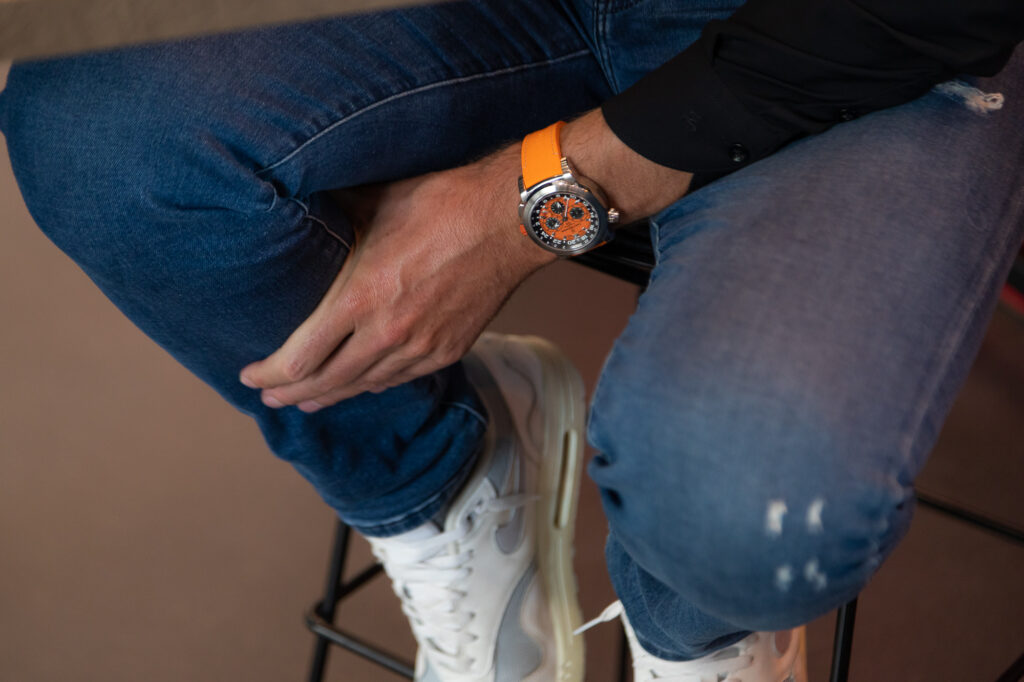 You've been through a number of Chefs as an athlete. Do you do things differently?
You've been through a number of Chefs as an athlete. Do you do things differently?
"Yes and no. I have my own style, but of course I stand on the shoulders of. The four chefs I have been through have taught me a lot, each in his own way. For example Jan Loorbach in 2000, great charismatic man, dean in the legal profession, but also former basketball player. Whenever he spoke, there was always something sensible and humorous in it. Then Charles van Commenée. A real coach, always put the sporting aspects first, was very clear... You take those kinds of things with you. My predecessor Maurits Hendriks... He put the sports landscape in a good organisational position... They all contributed to how I fulfil my tasks now."
Zooming in on the sport: you yourself are a former swimmer. But as a Chef, for example, what can you do for a... let's say judoka?
"You would actually have to ask them that. But what I would like to mean is that I -with my team, because alone you can't do anything at all- create an environment where people can be themselves. And in which they can peak at the right time. If a coach or athlete asks me to contribute something in some way, from my knowledge or network, I'm there for them."
With the Olympics approaching, it's always about politics too. Does that bother you, this mixing of sport and politics?
"It is the way it is. You have to deal with that and athletes have to deal with it. I'm just trying to say sensible things. We are the Dutch team, invited by the IOC. They are organising this greatest sports festival on earth. We, the NOC, are a national committee. They are responsible for the geopolitical piece, and we have to make the best of it between all the NOCs. That is why, for example, I think it is important that the Palestinian NOC is still in touch with Israel's. They are not mutually exclusive. That is also very valuable for us, for the other countries. So that we can manage it within the Olympic community."
Do you see sport playing an important role in this respect? As an avenue for fraternisation?
"Absolutely! Sport has a hugely important role within global politics. But don't underestimate the role of club life within our own society either. This is something we also pass on to the athletes. They can inspire new generations. With their performance, but also with their behaviour, they can touch people... "
Have you yourself ever experienced political pressure during your sports career?
"Yes. At my last games in Beijing, the finals would suddenly be swum in the morning, we were told. I found that already tricky, because we normally had the series in the morning and the finals in the evening. You have that at club championships, regional championships, national championships, everywhere. And then at the most important competition ever, it is suddenly reversed. And that only because we had to be on TV at primetime in the US. So that 'sacrifice' was something we as a swim team had to make.
But leading up to those particular Games, there were of course those stories about the human rights situation in China. And some people told me not to go at all. I seriously thought about that. Because if it could do some good, it was certainly worth it to me. But at the same time I was also told: don't do that, because such an action is news for one day and then forgotten. The impact is nil and you only have yourself with it.
If ''defending champion', for my fourth Olympics, I did of course take responsibility at the time and started talking to the IOC, to President Jaques Rogge, to all kinds of influencers and critical followers about the fact that the Games were being held in Beijing. The fact is, we as athletes have no influence on that. That is difficult to deal with, because you do want to do the right thing. Things like that always come into play. The athletes have to keep their focus and put blinders on and it is now up to us to manage that."
Athletes are there to perform, but they also use the stage to express themselves on all kinds of social issues. What do you think of that?
"We make sure they get good information, we talk to each other, know what we have on each other so we don't get surprised. They have a nice stage there and it is up to them to use it wisely. "
Own responsibility?
"Absolutely."
With the upcoming Games in Paris, there would be increased terrorist threats. With Munich '72 in mind, we know that such scenarios can become reality.
(Pondering) "Mmmm, it is of course a very important issue. But that's an Olympic fact: a lot of things play out all the time. I myself experienced two games before 9/11 and two after. There were tensions there too. In Athens, those circumstances there. You just have to deal with it. I have a lot of contact with the organising committee, with the IOC, we ourselves have a security officer within our team of games operations, which in turn has contact with the AIVD and there are international lines of communication there. So there is a network to keep up to date on what is going on. Security is an important aspect. If you see how tightly the opening ceremony is organised around the Seine, with all those security measures..."
Is this also alive among athletes?
"Of course it does. But I don't feel it negatively affects their preparation or performance. They also normally travel all over the world; they are used to some things. And it's up to us to manage this, as far as possible, and inform athletes and coaches."
On to a happier topic: time. What relationship do you have with it?
"In my line of work, it's all about time. Since childhood. It was the way to measure yourself. Whether you had improved, gone faster. Whether your training had had results. Very analytical, improving, trying things out, learning more and more. But at a certain point you reach such a high level, then certain goals come into sight, a world record for instance. And if you could then achieve that world record during the Games, chances were you would also become an Olympic champion. So that became our strategy. Very focused. I always had lists of times other swimmers swam at certain ages, so I could measure myself against them as imaginary opponents. I was always working on times. It was part of my constant motivation."
Faster times were more important to you than an opponent next to you in the water?
"Definitely. Constantly improving myself, that's what it was all about. Although I did take inspiration from opponents. If they swam a record, why couldn't I do the same. And then I went for that."
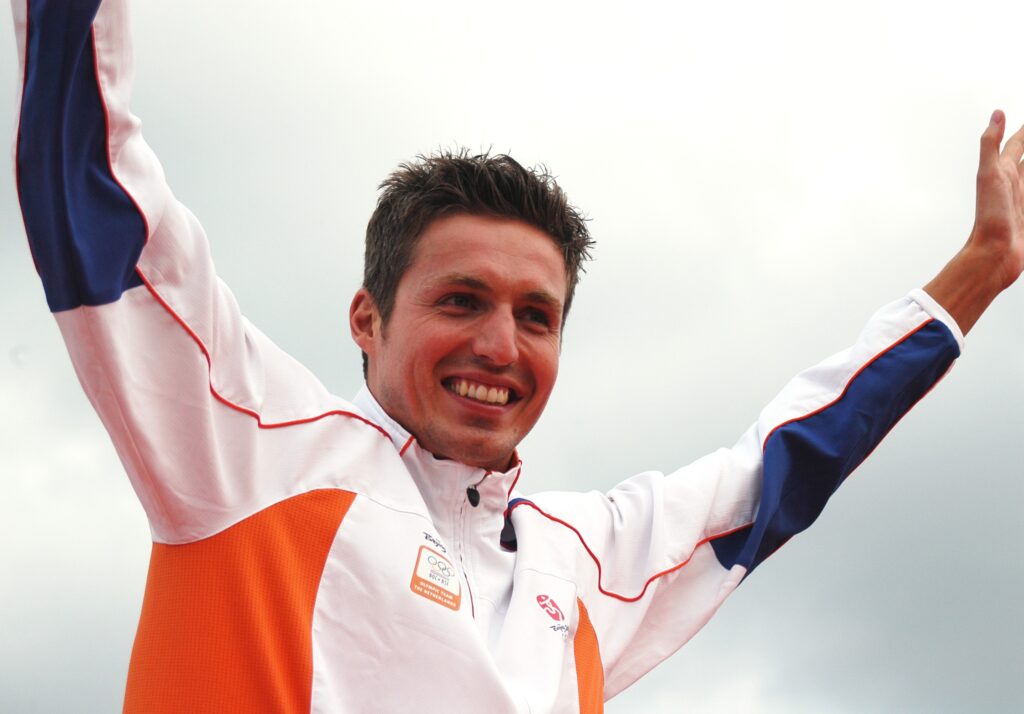 Your win over Ian Thorpe in Sydney 2000 at 200m free was your best win ever?
Your win over Ian Thorpe in Sydney 2000 at 200m free was your best win ever?
"It was the first time I became Olympic Champion. My predecessor was Wieger Mensonides. Who had won bronze in 200 metres breaststroke at the 1960 Olympics in Rome. But since then there had never been a Dutch man who won an Olympic swimming medal, let alone one who became champion. So I had to take a lot of steps to break that tradition. And when that succeeds at such an important distance, against such a great swimmer, such a great champion... That does have impact, yes."
Do you experience time in the water, when you swim a race, differently from on the shore?
"At a top competition, when you are well prepared, in good shape, you come into a flow. Then it seems that all things happen automatically, in a kind of slow-motion. A Messi in top form is indefensible. He sees what a defender is going to do before he knows it himself. Mark Huizinga, the judoka who won gold on the same day as me, was solving puzzles on the mat all the time, pushing there, pulling here... Automatisms take over in situations like that. Once you get into that kind of flow, time stands still, you enter a kind of other dimension. There is then no sense of time at all. "
And now, watching from the sidelines, are you biting your nails?
(laughing) "No, I look at that very differently, have a different perception of it. I grant them that victory, but don't experience any stress at all."
By on time: watch brand Carl F. Bucherer. You recently became a brand ambassador. Did you have anything to do with watches before then?
"A watch is the only.... um no... the most important piece of jewellery for men. For me, watches were always a gift. I gave my coach a watch as a gift. Gave my dad one, my uncle... And Ian Thorpe gave me a watch as a gift at my farewell. For me, these are moments you share and connect with loved ones, capturing time in a memory. It gives a lot of value in that way.
When Alexander (Wijt, distributor of Carl F. Bucherer in the Netherlands; GB) came to me with the idea of making me an ambassador, I was sceptical at first. Because I don't actually do this kind of thing. But his story spoke to me, about his entrepreneurship, about the family business behind this watch brand... And I am sensitive to that. When I was reinventing myself, a dear friend gave me a book by Jim Collins, Good to Great. While that is partly outdated, it also contains valuable lessons on how family businesses thrive because of their authentic culture. And I also know several family businesses here in the region and know how those people interact. So when I heard this story, it appealed to me, and I was quite willing to play a role in spreading it. In a dignified way, not showy, not of look at me."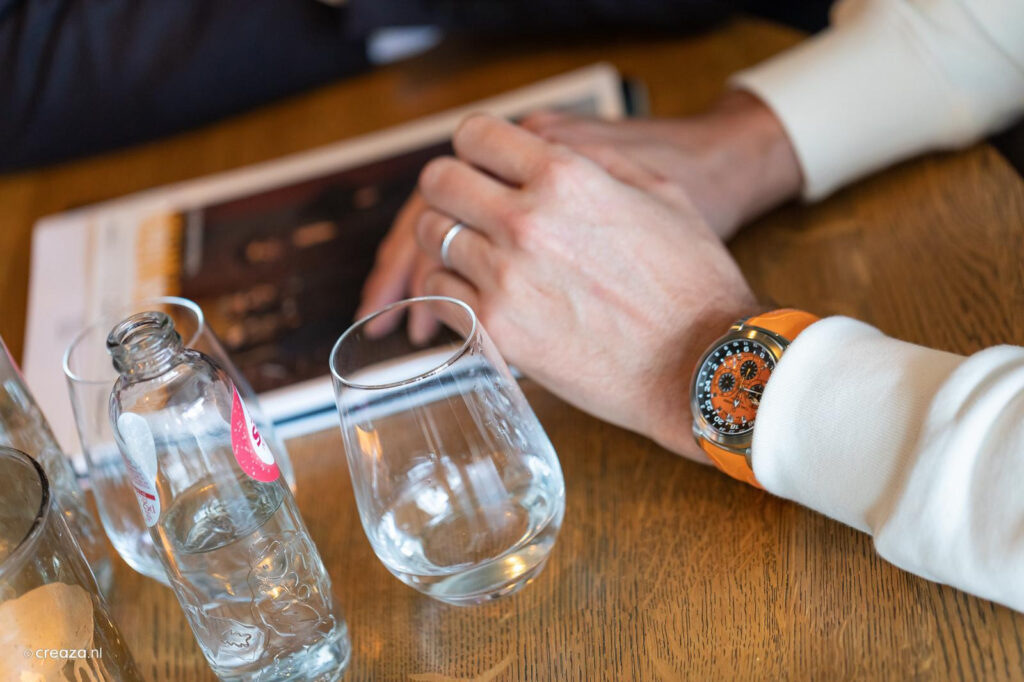
Does the watch suit you?
"It's sporting and the orange in particular naturally appeals to me. It gives me a certain kind of pride, especially in the run-up to the Games now. Surely it radiates something, also to the athletes. (laughing) And my children like it too!"
You've hung up your swimming trunks. But do you still play sports?
"Yes indeed. Mainly because of my children. In 2008, of course, I slimmed down to get a normal body and be a bit fit. I also think athletes deserve a mentally and physically fit Chef. But my eldest at one point came up with all kinds of youtube videos on strength training, where the revenue model was to sell powders and pills. That's when I offered to explain the basics of strength training to him. With that, we started working together in the garage. Wonderful to be able to do that with your son! Technique, technique, technique, without directly focusing on weight. That's how we train three times a week now."
No swimming children?
"No, my children love swimming, but especially in the sea during holidays."
Does the weight of a father who is an Olympic champion perhaps weigh too heavily to start competitive swimming himself?
"They never expressed that like that. My youngest is talented though, he won the school championships without preparation. When I asked if he didn't think it was a wonderful sport, he said it really wasn't for him. Way too cold and all that. He preferred team sports."
Doesn't that hurt because you yourself did share that swimming passion with your mother?
"No, because I know that such a trajectory in sport, with all the ambitions, with the challenges, with keeping it fun, requires huge intrinsic motivation. If that is not there right from the start, then the sport is pretty tough, mentally and physically."
Swimsuit, tracksuit or jacket with shirt... What do you feel best in these days?
"Jacket with shirt. For a swimmer, clothing is purely a functional thing. But in the role I have now, as a daddy of four children, Chef de Mission, the companies I work with... Then taking care of yourself, keeping your clothes in order, is also a form of respect towards others. I am no longer a top athlete, so no tracksuit for me."
Are you materially minded?
"No, my life motto is friends and stories. I have lost dear friends. To cancer, cardiac arrest, things like that. One friend was in the AMC, I went to visit him every week. And then you don't start talking about your nice house, your car... Then you talk about the people who are going to miss you when you are no longer there, about the adventures you had together.
That's also how I see this send-off to the Games. I have a nice team, with good experts. I have more in common with some than with others, of course, but together you make sure we will experience great things. That will also soon determine whether the Games have been a success for me. Of course the athletes have to have a good time, achieve great performances. But my children should also say that they were touched by some moments, moments like those of BMX rider Niek Kimman who suffered a fracture of his knee in Tokyo, yet got back up and still won gold. Or marathon runner Abdi Nageeye who won silver and also helped his Belgian companion cross the finish line for the bronze
That kind of wow moment I hope my children witness. Because if they enjoy that, more people will."
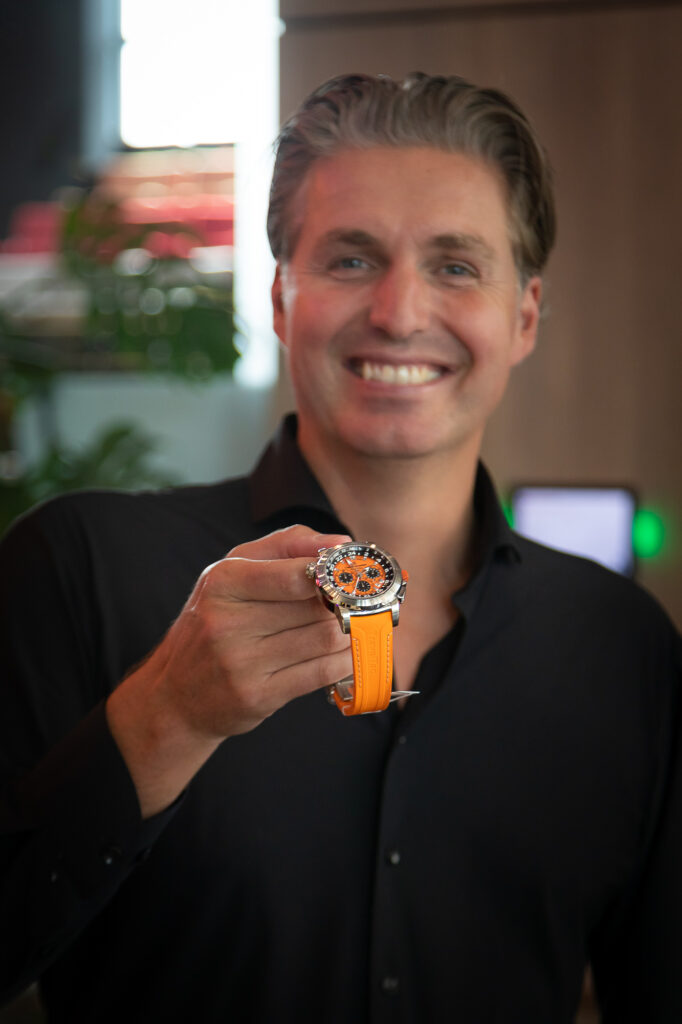 About the watch
About the watch
The Carl F. Bucherer Patravi TravelTec Orange. With a 46.6 mm stainless steel case, three time zones, chronometer precision and a chronograph function.



